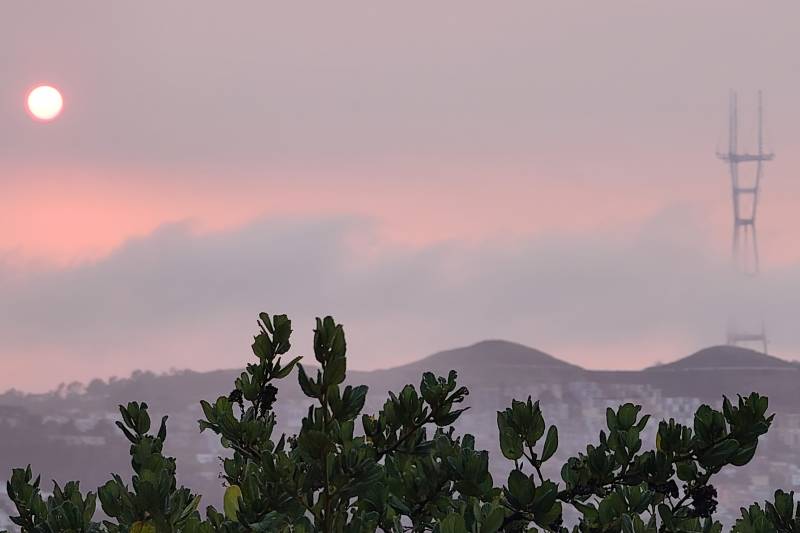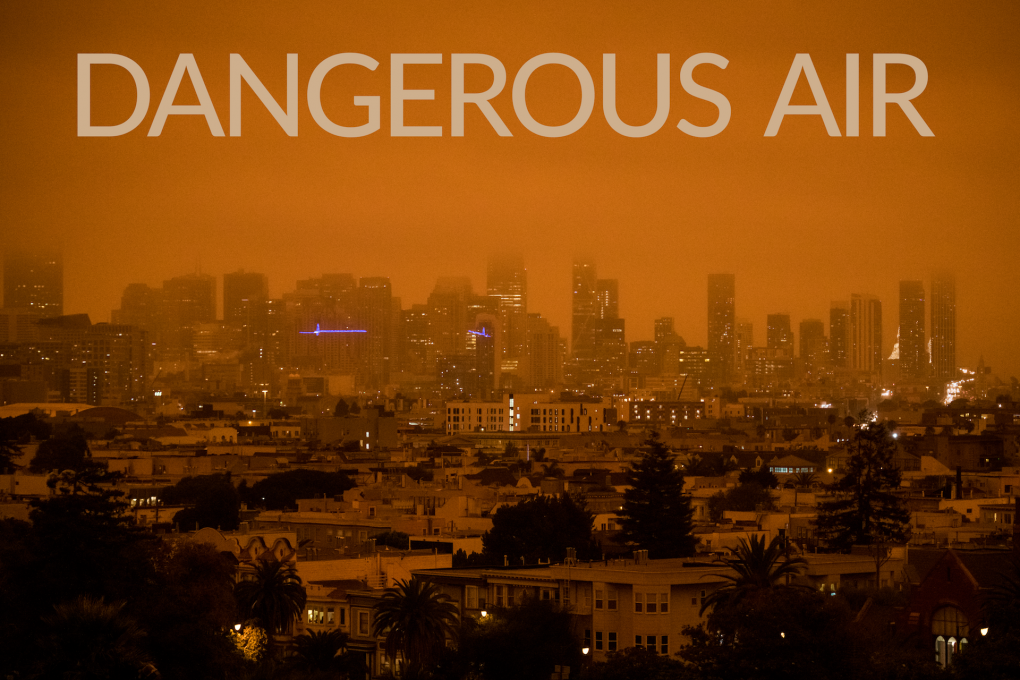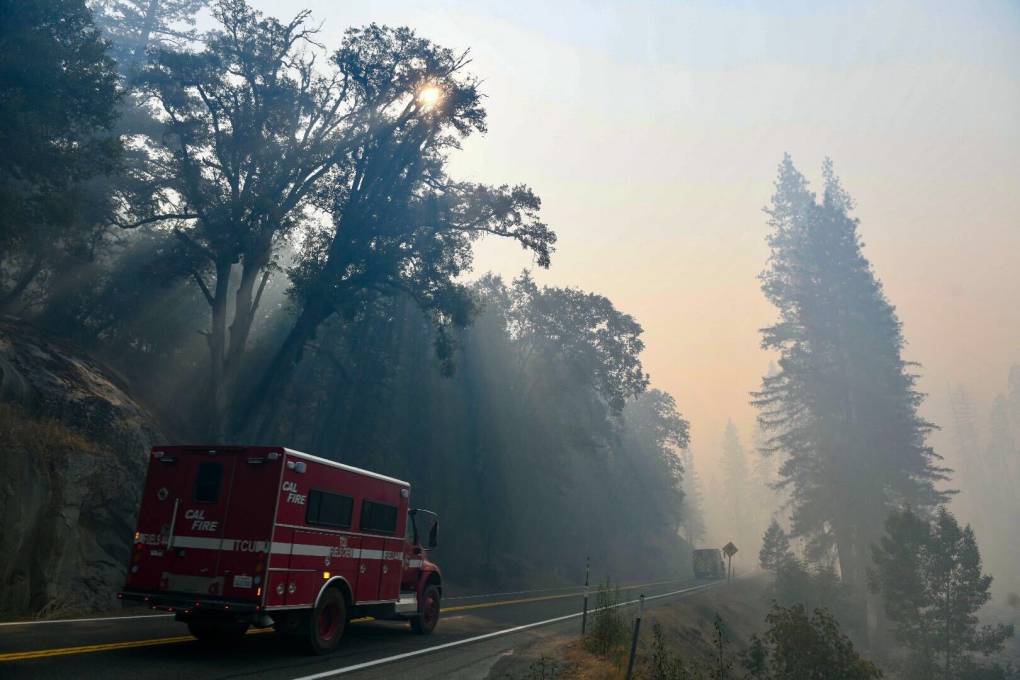State and federal lawmakers plan to introduce legislation and hold at least one oversight hearing in response to "Dangerous Air," an investigation from The California Newsroom — a collaboration of NPR, KQED and 16 public radio stations across the state — which showed that smoke from western wildfires is choking vast swaths of the country, from Los Angeles to Boston.
California Newsroom's 'Dangerous Air' Investigation Prompts Response from State, Federal Lawmakers


"This investigation confirms what we’ve known for years: As wildfires become more frequent due to climate change, the health of our communities will suffer,” said Rep. Ro Khanna (D-Santa Clara), who chairs the U.S. House Oversight Subcommittee on Environment, in an emailed statement.
“I will have a hearing on wildfires, smoke pollution, and commercial logging practices that may be making the problem worse. This is a matter of public health, environmental justice, and Congress has no option but to act," he said.
The investigation analyzed federal satellite imagery collected by the National Oceanic and Atmospheric Administration. Carried out in partnership with Stanford University’s Environmental Change and Human Outcomes Lab, it revealed a startling increase in the number of days residents were breathing smoke in cities across America.
In San José, which Khanna represents, residents breathed wildfire smoke an average of 45 days a year between 2016 and 2020, the investigation found, a 400% increase from the period between 2009 to 2013.
“We are living and breathing the climate crisis,” tweeted Rep. Jason Crow (D-Colorado). He noted our investigation showed his suburban Denver district was “seeing an average of 2 additional weeks of wildfire smoke per year — 14 more days of increased risk for asthma, respiratory disease, and premature births.”
Lawmakers from both parties said the investigation provided further evidence for a comprehensive government response. They advocated for better forest management, including prescribed burns, which experts say are crucial to stemming serious wildfires that send dangerous smoke into the skies. And there are proposals for the immediate term — including stronger protections for workers and the creation of smoke shelters, where people with elevated health risks can escape the dangerous air.
In California, where residents are most affected, Assemblymember Luz Rivas, a Democrat from Los Angeles who chairs the Assembly Natural Resources Committee, said she plans to introduce a legislative package to address wildfire smoke impacts.
One potential area of focus would be increasing protections for outdoor workers and standardizing when schoolchildren are not let out for recess to avoid being exposed to dangerous air. “A lot of my constituents are worried about their children and long-term health effects,” she said.
Rivas’s proposal is one of many that seeks to minimize the immediate health impacts of widespread smoke, recognizing it will take many years — and colossal amounts of money — to address the root causes.
Forest management and climate change
Forests across the western U.S. are overgrown, filled with bone-dry vegetation that fuels catastrophic fires. The Golden State saw its most active wildfire season in history last year, with 4.3 million acres burned, nearly 10,500 structures damaged or destroyed and 33 deaths. Over 2 million acres have burned so far this year.
Both Democrats and Republicans said the investigation showed more aggressive forest management is needed.
“The short- and long-term [solutions] come down to management of the lands where the fire starts,” said Rep. Doug LaMalfa (R-Richvale), whose district in rural Northern California includes areas where residents breathe smoke three months a year.
He says that thinning forestlands has gotten harder due to increased regulations. Projects can take years due to lengthy environmental reviews and the bureaucratic approval process.
Forest management does not mean “clear cutting” or removing all trees, LaMalfa said, adding that he and other lawmakers have been advocating for a variety of targeted management techniques, including forest thinning and prescribed burning. The California Legislature passed bills this year to change liability laws and create a $20 million insurance liability fund to encourage more prescribed burns.
Low- and moderate-intensity fire is a natural part of the forest ecosystem. But a century of aggressive forest suppression has snuffed out these so-called “good fires,” leading to a dangerous buildup of undergrowth. Fire scientists say state and federal governments need to substantially increase their forest management efforts.

For the government’s part, the ambition is there, but execution still lags. Last August, California entered into an agreement with the U.S. Forest Service to each perform fire prevention work on 500,000 acres annually in the state by 2025. The Forest Service remains well short of that goal, treating about 120,000 acres in the last year. Cal Fire was unable to provide up-to-date numbers on its progress toward the target.
Democrats also advocate for more aggressive action on climate change.
The Build Back Better Act — a $3.5 trillion, 2,000-plus page bill that captures many of President Biden’s policy priorities — includes several ambitious climate change proposals.
The legislation, currently being negotiated in Congress, includes a $150 billion program that would pay utility companies to reduce their greenhouse gas emissions. It’s unclear whether that provision will make it into the final legislation, however, as it has received pushback from Sen. Joe Manchin, a centrist Democrat whose vote is seen as crucial.
Fire scientists say climate change has set the stage for wildfires to burn out of control in recent years. LaMalfa, echoing some fellow Republicans, says prioritizing land management is "a lot better than this continued fight over what we're going to [do about] climate change.” Fire and climate experts argue a long-term plan for addressing climate change is essential for curbing wildfires, in addition to forest management.
Protecting essential workers
State lawmakers in California passed legislation this year to protect agricultural workers from the increasing dangers of wildfire smoke — and they’re looking to build on it next session.

Assembly Bill 73, which Gov. Gavin Newsom signed last week, ensures that the state’s stockpile of N95 masks is available to farmworkers during severe smoke events. It also requires employers to provide workers with training in the language they speak on the dangers posed by wildfire smoke.
Democratic Assemblymember Robert Rivas, who represents nearly 100,000 farmworkers, authored the bill to “ensure that we're doing all we can to protect the health and safety of such a vulnerable population of workers.”
Rivas says employers were already required to provide workers with masks, but struggled to acquire adequate PPE inventory.
Next session, Rivas may revive proposed requirements left out of the final bill. For example, an early version would have created “strike teams” deployed by the state to ensure employer compliance.
Rep. Jared Huffman (D-Petaluma), a member of the U.S. House Select Committee on the Climate Crisis, said it was time to start making policies for “smoke refugees” — for example, federally funded air shelters for residents who need a safe place to breathe.
“Almost like evacuation centers [on] one of these days where the air is just too unhealthy to breathe,” said Huffman, whose sprawling Northern California district runs from the Golden Gate Bridge to the Oregon border. “At least people that have fragile conditions, who maybe can't afford air conditioning or don't have things in their home to protect them, can go to these places and have quality air to breathe.”
Sen. Alex Padilla, along with several other Democrats, introduced a bill this year that would allow the president to declare a “smoke emergency." The federal government could then help communities establish smoke shelters and relocate vulnerable populations.
Better data, public health tracking
State and federal lawmakers also said they need reliable and comprehensive data in order to take action.
“Data in this area is absolutely critical [to] understanding the detrimental health impacts from wildfire smoke,” said Assemblymember Rivas.
The California Newsroom’s investigation relied on satellite images of smoke plumes rather than data on air quality itself, because air monitoring stations maintained by the U.S. Environmental Protection Agency are spread inconsistently across the country, with many gaps in rural and urban areas most affected by wildfire smoke.
At the federal level, Senate Democrats introduced the Smoke Planning and Research Act, which would set aside $20 million in research funding for the EPA to study the health impacts of smoke and create a grant program to fund research efforts at the local level.
This year, the California Legislature passed Assembly Bill 619, which requires the state Department of Public Health to develop safety guidelines for counties to implement during dangerous air quality days. The bill is on Newsom’s desk.